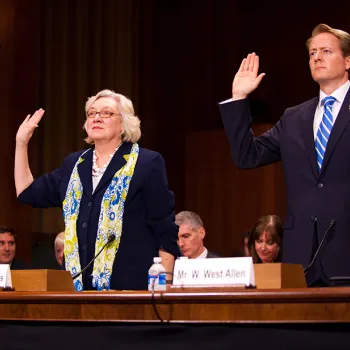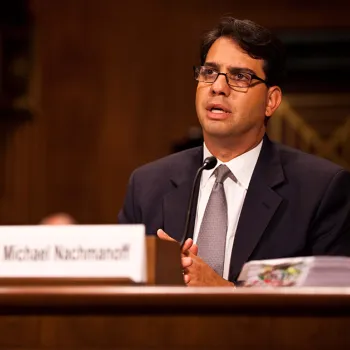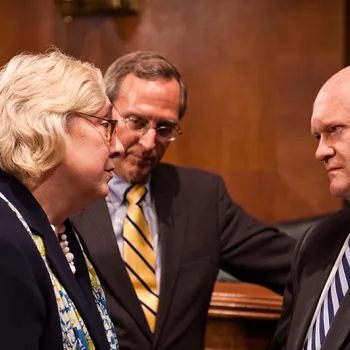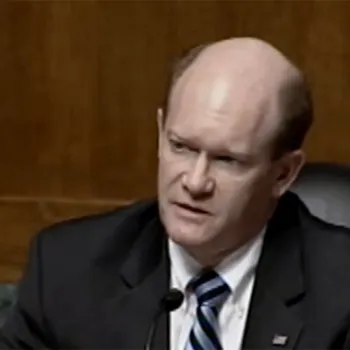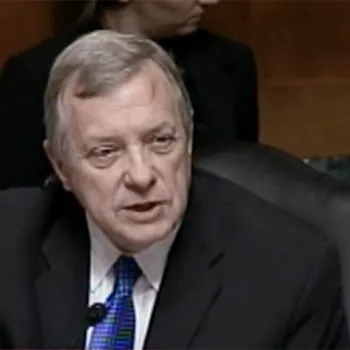In a congressional hearing on sequestration and the courts, a U.S. judge, federal defender and a private lawyer warned Senators that continued budget cuts would devastate the nation’s system of justice—threatening public safety, constitutional rights and economic well-being.
“Flat funding at sequestration levels would … irreparably damage the system that is a hallmark of our liberty around the world,” Judge Julia S. Gibbons told the Senate Judiciary Subcommittee on Bankruptcy and the Courts. “We look to Congress to recognize our critical needs, and our function in government, our value to the democracy, by providing the funding we need to do our work.”
Also testifying were Michael Nachmanoff, Federal Defender for the Eastern District of Virginia, and W. West Allen, Government Relations Committee chair for the Federal Bar Association.
The witnesses got a largely sympathetic reception from senators.
“The sequester is slowing the pace, increasing the cost, and potentially eroding the quality of the delivery of justice,” said Sen. Chris Coons (D-Del.), chair of the Judiciary subcommittee. “The irony is that cuts to the Judicial Branch … don’t actually save taxpayers any money. The cases will still be adjudicated, just at a slower pace and at a higher cost.”
Sen. Jeff Sessions (R-Ala.) expressed doubt that more money could be found for the courts, but he praised the federal Judiciary’s success in containing costs. “You have been asked … to take reductions more rapidly than smart people would ask you to take,” Sessions said. “The courts in many areas are being smart, they’re working hard, they’re finding ways to save money without impacting the quality of justice in America. And for that you should be saluted.”
Judge Gibbons, chair of the Budget Committee for the Judicial Conference of the United States, noted that court staffing levels are at their lowest level since 1999. Court offices have lost 2,100 employees since July 2011, a process that has accelerated with sequestration, which in March cut $350 million from the courts’ FY 2013 budget. A request from the courts for $72.9 million in supplemental funding has been submitted to Congress.
Throughout the July 23 hearing, the witnesses stressed that budget cuts already were being felt by the public, and were likely to get much worse in the next fiscal year. The impacts include delays in processing cases and diminished supervision of potentially dangerous offenders. Much of the hearing focused on cuts to defense representation for those who cannot afford attorneys.
“We are cutting ourselves to the bone. ... We're on the verge of being crippled,” Federal Defender Nachmanoff said. “If action is not taken immediately to save the program, the federal defender system will devastated.”
Nachmanoff noted that his Virginia office had turned down five “intensive, serious cases” because of widespread furloughs in his office.
Noting that full-time Federal Defenders provide the most economical approach to the constitutional right to counsel, he added, “We are a model of quality and efficiency. By reducing the staffing of federal defenders, ultimately the government will be spending more money. Indigent defense costs will rise.”
The support for defense funding was supported by two former prosecutors now in the Senate: Sheldon Whitehouse (D-R.I.), a former U.S. Attorney, and Amy Klobuchar (D-Minn.), a former county prosecutor. “We want a justice system that works,” Whitehouse said. “And we want a viable, robust public defender on the other side. … It’s good for the system.”
Whitehouse read from a June 12 letter, in which Attorney General Eric Holder and Deputy Attorney General James M. Cole stated: “We recognize that the Court system operates effectively only when all of its functions are adequately funded and fully operational. This includes funding for court employees, probation pretrial services offices, and defender services (which provides defense counsel guaranteed under the Sixth Amendment). An effective court system is one of the foundations of our democratic society, and one of the Nation’s bedrock institutions.”
In her testimony, Judge Gibbons said that the court’s probation and pretrial officers were struggling to provide adequate supervision and rehabilitation resources for defendants awaiting trial and criminal offenders serving probation in the community. Money for drug testing and mental health screening of offenders also has been cut.
Sen. Dick Durbin (D-Ill.) asked, “Am I right to be concerned that these reductions may lead to potentially violent individuals walking the streets of my city of Chicago without adequate supervision?”
“You’re quite right to be concerned,” Gibbons responded. “We have fewer officers to supervise an increasingly larger numbers. We have had to really seriously compromise some of the funds keeping folks we supervise out of further trouble. … Yes, this is a public safety risk throughout the country.”
Allen, of the Federal Bar Association, said cuts in clerks’ offices had increased delays in civil and bankruptcy cases, where litigants do not have a constitutional guarantee of a speedy trial. “Waiting for judicial rulings even on simple matters for up six months is not uncommon,” he said.
“Our current trajectory, of how the sequester is being implemented in the federal court system, is doing real harm,” Sen. Coons said in conclusion. “I leave this hearing today deeply concerned. … It is my veritable hope that Congress will take to heart the unique role of the Judiciary, and within it the federal public defenders.”
Subscribe to News Updates
Subscribe to be notified when the news section is updated.

